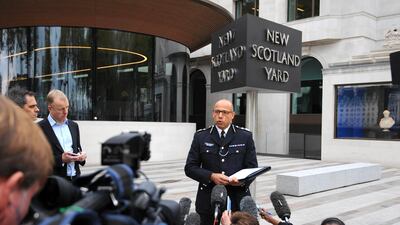Britain’s most senior counter-terrorism police officer has warned that far-right and Islamist radicals are driving a rising spiral of extremist violence in Britain.
“The two ideologies [far right and Islamist extremism] are both fuelling each other," Neil Basu, of London's Metropolitan police told UK lawmakers.
Attacks such as the 2017 Westminster Bridge attack by a group of extremists using a van and knives and the mowing down of a Muslim worshipper in north London had given violent extremists greater belief that their plans could work and spawned other attacks. “The success of one attack bred others,” he said.
He added that recent years had seen “a significant rise in religious hate crime – there is a tolerance issue”.
Mr Basu noted the threat had risen in recent years, citing British police’s disruption of some 13 terror plots in the four years prior to the Westminster attack, compared to 13 in the eight months following it.
The counter-terror officer noted the banning of two far right groups - Scottish Dawn and NS131 - said something “very dangerous about the state of society.”
Such groups presented a particular “threat to individual politicians”, highlighting the murder of British MP Jo Cox in 2016.
__________________
Political fringes of Britain on show as Tommy Robinson and Anjem Choudary hit the headlines
Notorious UK hate preacher Anjem Choudary freed from prison
__________________
He also spoke up in defence of Prevent, the UK’s controversial counter-extremism strategy, labelling it comprehensive. “We need moderate, influential, community voices to stand up and back prevent,” Mr Basu told the parliamentary Home Affairs select committee. “We need to stop leaving this vacuum for people to attack it.”
Mr Basu’s comments come just days after two of the country’s most visible extremist figures - from opposing sides of the spectrum - took centre stage in the British debate over extremism.
Far right figurehead and founder of the English Defence League Tommy Robinson remained on bail as his case of alleged contempt of court was referred to the UK’s Attorney General yesterday, and Islamist Anjem Choudary was released from prison last week.
Mr Robinson was arrested after he broadcast footage of four defendants during a number of sensitive rape-trials outside a court.
Mr Robinson claims his arrest and subsequent charge is an attempt to restrict his freedom of speech, and amounted to a cover up of the racial aspects of the trial he was filming at.
Controversy was further fuelled after Tuesday’s hearing and referral by Mr Robinson attending lunch at the British parliament by invitation of UKIP leader Gerrard Batten.
On the Islamist side of spectrum, radical preacher Anjem Choudary was released from prison last Friday after serving five-and-a-half years of a sentence for encouraging support for ISIS.
Asked about Mr Choudary, Mr Basu urged the British authorities to maintain pressure on his activities, calling Al Muhajiorun, the organisation he formerly led “broken”.
“All the great work that went into breaking that organisation is maintained," said Mr Basu.


